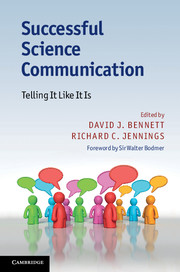Book contents
- Frontmatter
- Contents
- Foreword
- Authors' biographies
- Introduction Public engagement in an evolving science policy landscape
- Part I What it helps to know beforehand
- Part II Policy-makers, the media and public interest organisations
- Part III What you can do and how to do it
- 15 Building relations with the various groups
- 16 Finding the right words: how to shine in radio and television interviews
- 17 Nanotechnology and the media: front page or no story?
- 18 The power of the podcast: the Naked Scientists' story
- 19 The social web in science communication
- 20 Dealing with dilemmas and societal expectations: a company's response
- 21 Science festivals
- 22 Things to see and do: how scientific images work
- 23 The Triple Helix: the undergraduate student-run face of science communication
- 24 Public understanding of research: the Open Research Laboratory at the Deutsches Museum
- 25 Imagine: a communication project putting life sciences in the spotlight
- Part IV And finally, evaluating and embedding science communication
- Index
- Plate section
- References
15 - Building relations with the various groups
Published online by Cambridge University Press: 05 May 2013
- Frontmatter
- Contents
- Foreword
- Authors' biographies
- Introduction Public engagement in an evolving science policy landscape
- Part I What it helps to know beforehand
- Part II Policy-makers, the media and public interest organisations
- Part III What you can do and how to do it
- 15 Building relations with the various groups
- 16 Finding the right words: how to shine in radio and television interviews
- 17 Nanotechnology and the media: front page or no story?
- 18 The power of the podcast: the Naked Scientists' story
- 19 The social web in science communication
- 20 Dealing with dilemmas and societal expectations: a company's response
- 21 Science festivals
- 22 Things to see and do: how scientific images work
- 23 The Triple Helix: the undergraduate student-run face of science communication
- 24 Public understanding of research: the Open Research Laboratory at the Deutsches Museum
- 25 Imagine: a communication project putting life sciences in the spotlight
- Part IV And finally, evaluating and embedding science communication
- Index
- Plate section
- References
Summary
Why build relations?
I always remember the story about the then director of what is nowadays a major medical research centre – although both shall better remain nameless! He was faced with a great deal of very vocal opposition from the surrounding community to planned building extensions. And this was for medical research when you would normally expect support and encouragement. But the locals were up in arms about the land that would be taken and which could otherwise be used for much-needed local housing, disruption caused by the building works, subsequent increased traffic, and so on – the ‘NIMBY – not in my back yard’ syndrome if ever there was! He was asked what he had done about inviting the local people, journalists and politicians into the centre and showing them what was going on and why. Looking at his inquisitor with a rather baffled expression, he answered with words to the effect that ‘Oh, I never thought of anything like that and I would have been too busy anyway what with all the building planning work as well as running and developing the centre.’ The story does have a happy ending however because he took the message on board and acted on it immediately so that later it developed into a major medical research centre of world standing and of which the neighbouring community is now, and has been for some time, rightly proud.
That was a long time ago and nowadays many scientists do put a great deal of effort into building relations and communicating about their science personally. There must be very few universities and companies that do not have open days, schools outreach programmes and some of the other very broad range of things that can be done in building and maintaining effective relations with the different local and more distant key groups of people. This may well be so, but you may still ask ‘Why should I put time and effort into these kinds of things rather than just doing the research which I'm paid for and which my career depends on?’ and ‘It would take a lot of time out from my research and I don't get any recognition or reward for doing it’ or ‘Even if I feel I should do something, I really don't know what to do or how to do it, and isn't the PR department supposed to do it anyway?’ These and similar are very good questions so let's have a look at them before we go on.
- Type
- Chapter
- Information
- Successful Science CommunicationTelling It Like It Is, pp. 223 - 239Publisher: Cambridge University PressPrint publication year: 2011



